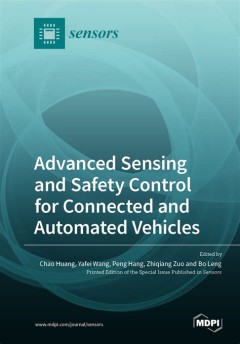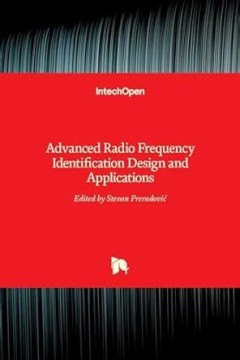Filter by

Advanced Sensing and Safety Control for Connected and Automated Vehicles
The connected and automated vehicle (CAV) is a promising piece of technology, anticipated to enhance the safety and effectiveness of mobility. Advanced sensing technologies and control algorithms, working to acquire environmental data, analyze data, and regulate vehicle movements, are key functional components of CAVs. In recent years, the creation of innovative sensing technologies for CAVs ha…
- Edition
- -
- ISBN/ISSN
- 9783036573304; 9783036573311
- Collation
- 250 hlm,: ill, lamp; 21 cm
- Series Title
- -
- Call Number
- -

Advanced Sensing and Image Processing Techniques for Healthcare Applications
This Special Issue aims to attract the latest research and findings in the design, development and experimentation of healthcare-related technologies. This includes, but is not limited to, using novel sensing, imaging, data processing, machine learning, and artificially intelligent devices and algorithms to assist/monitor the elderly, patients, and the disabled population.
- Edition
- -
- ISBN/ISSN
- 9783036540320; 9783036540313
- Collation
- 258 hlm,: ill, lamp; 21 cm
- Series Title
- -
- Call Number
- -

Advanced Sensing and Control for Connected and Automated Vehicles
Connected and automated vehicles (CAVs) are a transformative technology that is expected to change and improve the safety and efficiency of mobility. As the main functional components of CAVs, advanced sensing technologies and control algorithms, which gather environmental information, process data, and control vehicle motion, are of great importance. The development of novel sensing technologi…
- Edition
- -
- ISBN/ISSN
- 9783036534886
- Collation
- 284 hlm,: ill, lamp; 21 cm
- Series Title
- -
- Call Number
- -

Advances in Microfluidics Technology for Diagnostics and Detection
Lab-on-a-Disc (LoaD) biosensors are increasingly a promising solution for many biosensing applications. In the search for a perfect match between point-of-care (PoC) microfluidic devices and biosensors, the LoaD platform has the potential to be reliable, sensitive, low-cost, and easy-to-use
- Edition
- -
- ISBN/ISSN
- 9783036513669
- Collation
- 123
- Series Title
- -
- Call Number
- -

Advanced Radio Frequency Identification Design and Applications
Radio Frequency Identification (RFID) is a modern wireless data transmission and reception technique for applications including automatic identification, asset tracking and security surveillance. This book focuses on the advances in RFID tag antenna and ASIC design, novel chipless RFID tag design, security protocol enhancements along with some novel applications of RFID.
- Edition
- -
- ISBN/ISSN
- 9789535159896
- Collation
- -
- Series Title
- -
- Call Number
- -

Advanced Radio Frequency Antennas for Modern Communication and Medical Systems
The main objective of this book is to present novel radio frequency (RF) antennas for 5G, IOT, and medical applications. The book is divided into four sections that present the main topics of radio frequency antennas. The rapid growth in development of cellular wireless communication systems over the last twenty years has resulted in most of world population owning smartphones, smart watches, I…
- Edition
- -
- ISBN/ISSN
- 9781839683473
- Collation
- 280 hlm,: ill, lamp; 21 cm
- Series Title
- -
- Call Number
- -

Advanced Pulse Laser Machining Technology
This reprint is the printed edition of the Special Issue published in Materials. The reprint provides an overview on current international research activities in the field of advanced pulse laser machining technology. It covers fundamental and applied aspects and collects contributions of renowned scientists from academics and industries working in the fields of laser processing, materials scie…
- Edition
- -
- ISBN/ISSN
- 9783036566337
- Collation
- 286 hlm,: ill, lamp; 21 cm
- Series Title
- -
- Call Number
- -

Advanced Propulsion System and Thermal Management Technology
The reprint focused on innovative developments in the fields of advanced propulsion system and thermal management technology. Propulsion systems develop along the direction of wide speed range and long endurance both for civil aircrafts and military applications. The research works of propulsion systems mainly include overall design, combustion, aerodynamic, internal flows and heat transfer etc…
- Edition
- -
- ISBN/ISSN
- 9783036580050
- Collation
- -
- Series Title
- -
- Call Number
- -

Advanced Process Monitoring for Industry 4.0
This book reports recent advances on Process Monitoring (PM) to cope with the many challenges raised by the new production systems, sensors and "extreme data" conditions that emerged with Industry 4.0. Concepts such as digital-twins and deep learning are brought to the PM arena, pushing forward the capabilities of existing methodologies to handle more complex scenarios. The evolution of classic…
- Edition
- -
- ISBN/ISSN
- 9783036520742
- Collation
- 288 hlm,: ill, lamp; 21 cm
- Series Title
- -
- Call Number
- -

Advanced Powder Metallurgy Technologies
Powder metallurgy is a group of advanced processes used for the synthesis, processing, and shaping of various kinds of materials. Initially inspired by ceramics processing, the methodology comprising the production of a powder and its transformation to a compact solid product has attracted attention since the end of World War II. At present, many technologies are availabe for powder production …
- Edition
- -
- ISBN/ISSN
- 9783039365241
- Collation
- -
- Series Title
- -
- Call Number
- -
 Computer Science, Information & General Works
Computer Science, Information & General Works  Philosophy & Psychology
Philosophy & Psychology  Religion
Religion  Social Sciences
Social Sciences  Language
Language  Pure Science
Pure Science  Applied Sciences
Applied Sciences  Art & Recreation
Art & Recreation  Literature
Literature  History & Geography
History & Geography